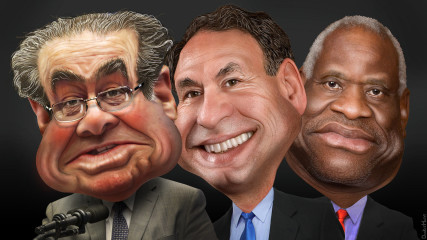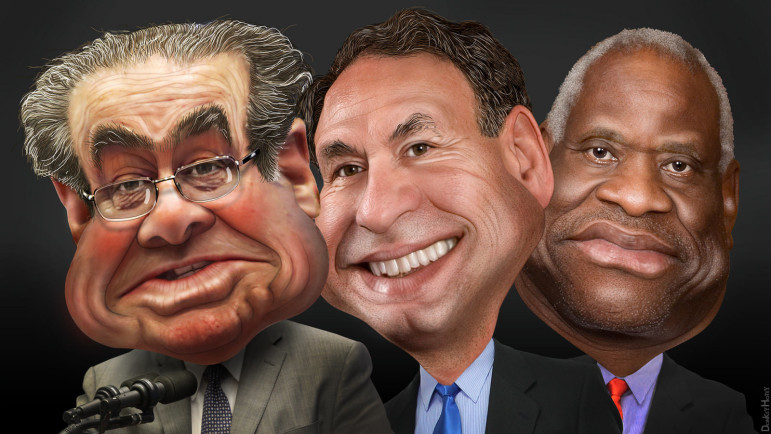Guest post by Daniel Bennett
Could a religious university lose its tax-exempt status over the issue of gay marriage? Last week’s decision in Obergefell v. Hodges didn’t swing the doors open to such a prospect, but it didn’t exactly close them, either.

Antonin Gregory Scalia, aka Antonin Scalia, is an Associate Justice of the Supreme Court of the United States. Samuel Anthony Alito, Jr., aka Sam Alito, is an Associate Justice of the Supreme Court of the United States. Clarence Thomas is an Associate Justice of the Supreme Court of the United States. Caricature by DonkeyHotey via Flickr creative commons. https://www.flickr.com/photos/donkeyhotey/19156454411/
In April’s oral arguments, Solicitor General Donald Verrilli appeared to tip the Obama administration hand on a topic of concern for many religious conservatives: whether a religious non-profit could lose its tax-exempt status by opposing same-sex marriage.
Justice Alito: In the Bob Jones case, the Court held that a college was not entitled to tax-exempt status if it opposed interracial marriage or interracial dating. So would the same apply to a university or college if it opposed same-sex marriage?
General Verrilli: You know, I don’t think I can answer that question without knowing more specifics, but it’s certainly going to be an issue. I don’t deny that. I don’t deny that, Justice Alito. It is going to be an issue.
In Bob Jones University v. United States, the college lost its tax-exempt status after the IRS said Bob Jones’ prohibition on interracial relationships did not serve the public interest, a requirement of tax-exempt organizations. And if opposition to same-sex marriage is seen as not serving the public interest…well, you get the idea.
Last week’s decision in Obergefell did little to assuage the concerns of religious conservatives. Justice Kennedy, who authored the decision, declared that the decision would not penalize those objecting to same-sex marriage:
It must be emphasized that religions, and those who adhere to religious doctrines, may continue to advocate with utmost, sincere conviction that, by divine precepts, same-sex marriage should not be condoned. The First Amendment ensures that religious organizations and persons are given proper protection as they seek to teach the principles that are so fulfilling and so central to their lives and faiths, and to their own deep aspirations to continue the family structure they have long revered.
The dissenting justices, however, were not satisfied by Kennedy’s language. Chief Justice Roberts chastised the majority for failing to offer more support to religious liberty:
The majority graciously suggests that religious believers may continue to “advocate” and “teach” their views of marriage. The First Amendment guarantees, however, the freedom to “exercise” religion. Ominously, that is not a word the majority uses. Hard questions arise when people of faith exercise religion in ways that may be seen to conflict with the new to same-sex marriage—when, for example, a religious college provides married student housing only to opposite-sex married couples, or a religious adoption agency declines to place children with same-sex married couples…. Unfortunately, people of faith can take no comfort in the treatment they receive from the majority today.
And Justice Thomas suggested that the decision, in ending the debate over marriage entirely, might harm religious liberty:
Although our Constitution provides some protection against such governmental restrictions on religious practices, the People have long elected to afford broader protections than this Curt’s constitutional precedents mandate. Had the majority allowed the definition of marriage to be left to the political process—as the Constitution requires—the People could have considered the religious liberty implications of deviating from the traditional definition as part of their deliberative process. Instead, the majority’s decision short-circuits that process, with potentially ruinous consequences for religious liberty.
Religious conservatives have some reason for optimism, though. The IRS has never hinted it will revise tax-exempt status requirements beyond the Bob Jones threshold. Even if it did, Congress could pass a law correcting the action. And if the issue ever reached the courts, a religious non-profit could make the same kind of claim endorsed in Burwell v. Hobby Lobby, where Justice Kennedy voted with the majority.
Still, such an outcome is possible. And if the Solicitor General and Obergefell’s dissenting justices are to be believed, these conflicts are inevitable. Though the legal debate over same-sex marriage may be over, the next debate is already underway.
Daniel Bennett, PhD, researches the conservative legal movement. He is an assistant professor of political science at Eastern Kentucky University. You can follow him on twitter at @BennettDaniel.
Don’t miss any more posts from the Corner of Church & State. Click the red subscribe button in the right hand column. Follow @TobinGrant on Twitter and on the Corner of Church & State Facebook page.





